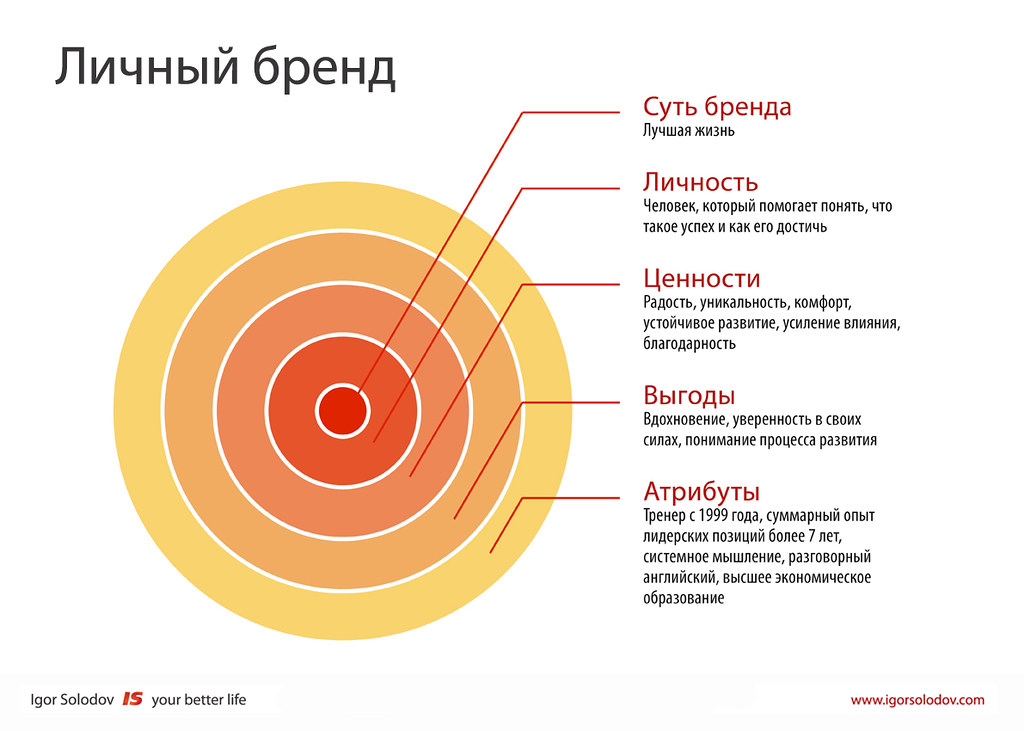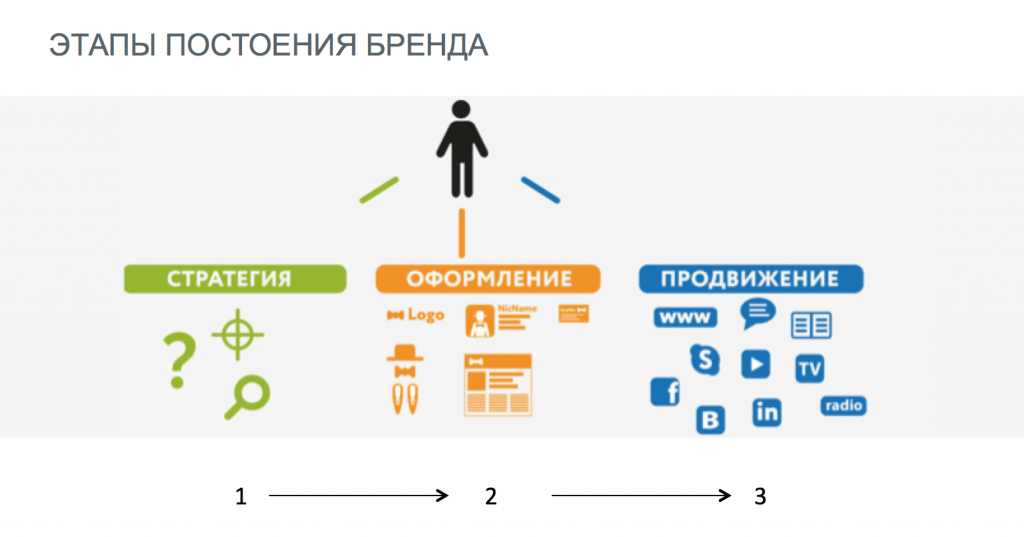What is a personal brand
Личный бренд — это концепция, которая стала особенно актуальной в наше время, когда личность и ее имидж играют важную роль в карьерном и личном успехе. Личный бренд представляет собой уникальную комбинацию личных качеств, навыков, ценностей и опыта, которые отличают человека от других и создают его узнаваемость и привлекательность в глазах окружающих.
Основная цель личного бренда — создать сильное и позитивное впечатление о себе и своих компетенциях, установить доверие и привлечь внимание целевой аудитории. Личный бренд позволяет управлять своим имиджем, контролировать то, как нас воспринимают другие люди и как мы представляемся в обществе. Он выступает в роли визитной карточки, которая отражает нашу уникальность и профессионализм.
Building a personal brand begins with self-knowledge and defining our own values, passions, and goals. This helps us identify our strengths and how we can be unique and valuable to others. Next comes an analysis of the audience we want to attract and influence. This helps us identify key messages and communication methods that will be most effective.
One of the main tools in creating a personal brand is the active use of social networks and online platforms. Here we can present ourselves and our achievements, share useful content, establish contacts and interact with the audience. It is important to maintain consistency between our values, messages and the visual design of our profiles to create a unified style and image.
However, a personal brand is not limited to an online presence. It is also important to develop your professional skills, strive for personal growth, and offer value to your audience. The more we invest in our development and expertise, the stronger our personal brand becomes.
Successfully building a personal brand takes time, effort, and consistency. It can’t be built overnight, but with consistent work on ourselves and our image, we can achieve noticeable results. A personal brand helps us stand out in the job market, attract new opportunities, establish valuable connections, and increase our credibility as professionals.

Who needs to develop a personal brand
In today's world, where competition is becoming increasingly fierce and information flows are constantly expanding, developing a personal brand is becoming an important strategic step for various categories of people. Regardless of your professional field or life goals, developing a personal brand can bring many benefits and open up new opportunities. Let's consider who especially benefits from developing a personal brand.
- Entrepreneurs and Business Leaders: A personal brand is an essential success factor for entrepreneurs and business leaders. A strong personal brand allows you to establish authority, attract customers and investors, and establish partnerships with other individuals in your industry. Through a personal brand, entrepreneurs and business leaders can highlight their skills, experience, and values, which helps build trust and increase influence.
- Professionals and Experts: Developing a personal brand is key for professionals and experts in a variety of fields. Whether you’re a doctor, lawyer, financial advisor, or designer, a strong personal brand helps establish you as an authoritative and recognizable professional. This opens doors to new job opportunities, public speaking engagements, partnerships, and even the opportunity to become a media expert in your field.
- Students and Graduates: Developing a personal brand while still in school can be a significant advantage for students and graduates. An active social media presence, content creation, project participation, and networking can help schools and potential employers notice you.

Levels and main stages of building personal branding
In our modern world, every person is already a brand at a certain level. However, to understand how this brand manifests itself, it is enough to analyze how we behave on social networks and manifest ourselves in everyday life. We can distinguish six levels that will help to understand this issue:
- Visual Content: Beautiful photos and videos can be the entry level of branding. Blogs by travelers, photographers, or just people who showcase their lives through attractive pictures can attract attention and fame.
- Hobbies and Achievements: Your hobbies, interests, and achievements can be attractive to others. By sharing your activities and involvement in various activities, you can gather a large audience of fans around you.
- Unique Skills: If you have unique skills that set you apart from others, this will be your advantage. Whether it is achieving perfect physical shape, talent in art, or the ability to write beautiful texts, you will be able to be remembered and attract attention.
- Values and Beliefs: This level involves a deep expression of your personality. Identifying your values and communicating them to your audience will help you connect even more deeply. Some people will leave your audience, but others will be even more drawn to you.
- Personality: Your behavior, communication style, outlook on life and reactions to events reveal your unique personality. Some audiences will be close to you, and others will not. And this is absolutely normal, because you can’t please everyone.
- Mission: If you add this level to your brand, you can say that you are actively working on your personal brand. Your mission could be to improve the world, and you can lead people through your ideas and values.
Thus, developing a brand on all six levels will allow you to build a strong and recognizable identity that will attract attention and open up new opportunities in your life.
Each person has their own unique potential that can be revealed throughout life. Some manage to fully realize their potential, others achieve only a part of their capabilities, and there are those who doubt themselves so much that they do not even begin to develop themselves. Developing a personal brand becomes an important stage in the process of this transformation.
Let's look at the main stages of building a personal brand.
Первый этап — позиционирование и образ. Необходимо задать себе вопросы: «Какую ценность я могу принести этому миру?» и «Каким способом?». Кроме того, важно продумать свой внешний и ментальный образы. Подумайте о том, чем вы отличаетесь от конкурентов. Здесь важно определить уникальную черту, которая будет присутствовать во всей вашей деятельности.
Второй этап — SWOT-анализ. На этом этапе следует анализировать свои сильные и слабые стороны, характер, достижения, навыки, знания и многое другое.
Третий этап — целевая аудитория. Это группа людей, которые готовы и способны платить за ваши услуги или продукты. Целевая аудитория не может включать всех людей. Важно определить конкретный пол, возраст, профессию и интересы своей целевой аудитории. Люди из вашей целевой аудитории имеют определенные проблемы, которые вы можете решить благодаря своей экспертизе.
Четвертый этап — уникальное торговое предложение (УТП). Это основная идея вашего предложения, которая отличает вас от конкурентов.
Пятый этап — tone of voice. Здесь речь идет о вашем общении с аудиторией. Вы можете обращаться к ним на «ты» или «вы». Обращения могут быть более дружелюбными или официальными. Выберите тот стиль общения, который ближе вам.
Шестой этап — оформление блога. Ваш блог должен быть стильным и понятным. Посетители вашего аккаунта должны сразу понять, насколько интересно им здесь и хотят ли они оставаться на вашей странице надолго.
Важно помнить, что развитие личного бренда — это процесс непрерывный. Нельзя построить его один раз и забыть. Регулярные обновления вашего образа будут необходимы, чтобы оставаться актуальным и привлекательным для вашей аудитории.

What content should be made?
- Target audience and their needs: Before creating content, you need to identify your target audience and understand their needs and interests. Research your target audience, conduct a market and competitor analysis. This will help you target the right content and create materials that will be relevant and interesting to your audience.
- Unique Content: To develop your personal brand, you need to offer unique and original content. Focus on your expertise, share your knowledge, ideas, and practical recommendations with your audience. Be creative and don’t be afraid to stand out from the crowd.
- Blog: Creating and maintaining a blog is one of the most important tools for developing a personal brand. A blog allows you to regularly publish your thoughts, ideas, tips, and knowledge. Try to be consistent in publishing new materials to keep your audience interested and strengthen your expertise in your chosen field.
- Social Media: Having an active social media presence is an essential part of developing a personal brand. Choose social platforms where your target audience is present and constantly update your profiles with informative and interesting content. It is important to maintain a dialogue with your audience, respond to comments and questions, and build relationships with your followers.
- Videos and Webinars: Video content is one of the most popular formats in the modern world. Creating video content allows you to connect more closely with your audience, showcase your expertise, and visualize your message. Host webinars or live streams regularly to share knowledge and interact with your audience in real time.
- Guest Posting and Industry Event Participation: Increase your visibility and network with other experts by guest posting on popular blogs or websites. Also, actively participate in industry events, conferences, and seminars where you can share your knowledge and make valuable professional contacts.
- Reviews and Recommendations: Collect reviews and recommendations from satisfied customers or partners and publish them on your platforms. Positive reviews will help strengthen your reputation and attract new audiences.
- Continuous learning and development: Remember that developing a personal brand requires continuous learning and development. Stay up to date with the latest trends and news in your field, improve your skills, and constantly expand your knowledge.

How important is it to communicate with your audience?
Initially, interpersonal relationships are of great importance, and this applies not only to interactions with subscriber-customers, but also with colleagues in the field and influential audience members. Leaving respectful expert comments on thematic posts of other users on social networks is a great way to attract new audiences without having to spend money on advertising.
If you’re not comfortable with live streaming or attending events, you can still communicate with your followers in writing. Collect their questions and create a series of stories or videos where you answer them. Record yourself on camera to get an idea of how you look and sound your best. Practice in front of a mirror or with your loved ones. You might want to consider taking public speaking lessons to hone your speaking skills.

Is it worth seeking help from an advertising agency?
Nowadays, when competition in the labor and business market is becoming increasingly fierce, it is important to be able to stand out among many other professionals and offers. Creating and promoting a personal brand is becoming an integral part of career success. One of the options for effective promotion of a personal brand is to seek help from an advertising agency. But is it worth doing? Let's consider some aspects and advantages of such cooperation.
- Professional expertise and experience: Advertising agencies have professional knowledge and experience in the field of marketing and promotion. They know how to create effective strategies, identify target audiences and choose the most appropriate communication channels. Working with experienced professionals can help you develop a unique and attractive strategy for promoting your personal brand.
- Resources and Tools: Advertising agencies have access to a variety of resources and tools that may not be available to you individually. They can use advanced technology, conduct market research, analyze data, and conduct testing to determine the most effective approaches to promoting your personal brand. Using these resources and tools can greatly improve your promotion results.
- Saving time and effort: Promoting a personal brand requires significant time and energy. Turning to an advertising agency allows you to focus on your core business while marketing and advertising specialists work on promoting your personal brand. This allows you to use resources effectively and achieve faster and better results.
- Objective View and New Ideas: Advertising agencies can offer you a fresh look at your personal brand and offer new ideas for promoting it. Sometimes we ourselves cannot see our strengths and weaknesses or do not notice opportunities that can be useful in promotion. Working with professionals from an advertising agency allows you to get an objective assessment and new views on your personal brand.
- Wide reach and access to target audience: Advertising agencies have experience working with various communication channels and can help you achieve wide reach and attract the attention of your target audience. They know how to use social media, search engines, advertising platforms and other tools to effectively promote your personal brand.
However, it is also necessary to take into account that contacting an advertising agency may be associated with certain costs and budgetary restrictions. Therefore, before making a decision, it is worth carefully analyzing your needs and capabilities, as well as studying the reputation and experience of the advertising agency.
Ultimately, seeking help from an advertising agency to promote your personal brand can be an effective solution, especially if you want to achieve fast and high-quality results. Professional expertise, access to resources and tools, and the ability to save time and energy are all benefits that an advertising agency can offer you in the process of promoting your personal brand.
And finally - how to make money on your personal brand?
In today's digital world, where personal reputation is becoming increasingly important, many people are thinking about how to use their personal brand to make money. A personal brand is a unique combination of qualities, skills, and values that make a person recognizable and attractive to others. In this article, we will look at several strategies that will help you make money from your personal brand.
- Expert Positioning: One way to monetize your personal brand is to become an expert in a specific field. Find a niche in which you have deep knowledge and expertise, and start sharing your knowledge through blogs, social media posts, podcasts, or video tutorials. This will help you attract an audience that will be willing to pay for your consultations, training programs, or services.
- Courses and trainings: If you have unique skills or expertise, you can create and sell online courses and trainings. This could be a full course on a specific topic, a series of webinars, or individual consultations. It is important to create quality content and offer value that will help your clients achieve specific results.
- Partnerships and sponsorships: As you develop your personal brand, you can attract the attention of companies and brands that are interested in collaborating with you. This could be sponsoring your content, creating joint products or services, participating in marketing campaigns, etc. It is important to choose partners that match your values and interests so that the collaboration is mutually beneficial and supports your reputation.
- Authoring a Book or E-Publishing Article: If you have expertise in a particular field, writing a book or e-publishing article can be a great way to not only make money, but also establish your authority. Publishing your work can help you promote your personal brand, attract new clients, and open up additional income opportunities.
- One-on-one consultations and coaching: If you have skills in coaching, mentoring, or consulting, you can offer one-on-one sessions to your audience. One-on-one consultations allow you to engage with clients on a deeper level, help them achieve their goals, and receive personalized support and advice.
- Creating Products and Physical Goods: If your personal brand is associated with a certain lifestyle, values, or interests, you may want to consider creating and selling your own products or physical goods. These could be merchandising items, clothing, accessories, cosmetics, or any other items that align with your brand and will appeal to your audience.
It is important to note that building a successful personal brand takes time, patience, and constant work on yourself and your skills. Be consistent in your actions, create valuable content, interact with your audience, and build long-term relationships with your followers and customers.
Making money from a personal brand is possible, but it requires constant development, building trust, and offering value to your audience. Follow your passions and interests, strive for constant improvement, and don’t be afraid to stand out. Ultimately, your personal brand can be a source of not only financial gain, but also the satisfaction of doing something you truly enjoy and are an expert at.








